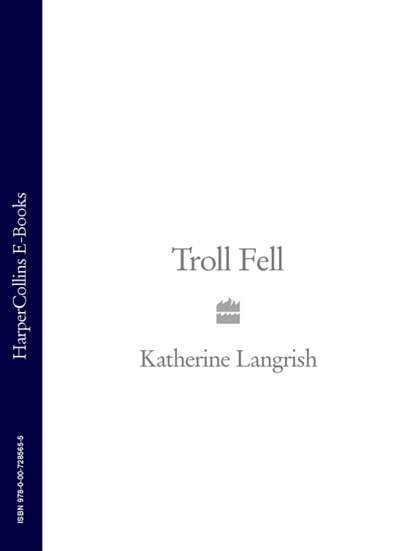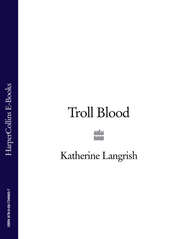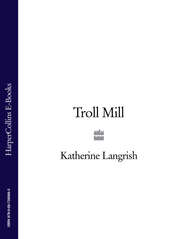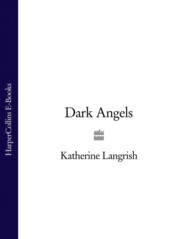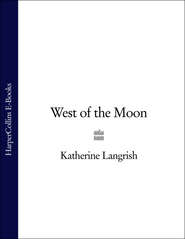По всем вопросам обращайтесь на: info@litportal.ru
(©) 2003-2025.
✖
Troll Fell
Настройки чтения
Размер шрифта
Высота строк
Поля
“On nice soft sacks!” Grim offered.
“It’s too small – I can’t breathe. Cramped – dark!” panted Peer, shamefaced, his heart still pounding.
His uncles stared at him unbelievingly. Slowly, Baldur began to grin. “Cramped! Dark!” he mimicked. His grin developed into a chuckle. “D’you hear that, Grim? He’s afraid of the dark! The boy’s afraid of the dark!”
For the second time that night, the two brothers roared with laughter, while Peer glowered at the floor. They pounded one another on the back, they coughed and choked and staggered about. At last, Uncle Baldur recovered. The old, bad-tempered scowl settled back on his face.
“So go and sleep in the barn!” he snarled at Peer, who nodded speechlessly, his cheeks flaming.
“It’s late, you know!” yawned Grim.
“Bedtime,” nodded his brother. They sat down heavily on their bunks, wrestled with the blankets, wrapped themselves up and turned over.
Peer tiptoed past. On his way to the door he had to step over Grendel, who opened one glinting red eye and wrinkled his lips in a silent snarl. Quickly and quietly Peer got through the door and crossed the yard.
The barn was dark, but it felt high and sweet and airy. Peer pulled crackling straw up over his knees and woke Loki, who gobbled the crust Peer had saved for him.
“There’s no more,” said Peer. He pushed aside Loki’s hopeful nose, and lay down, exhausted.
It was not completely dark in the barn. Outside the sky had cleared and the moon had risen. A few bright stripes of moonlight lay across the floor and wooden stalls. Peer lay on his back, too tired to sleep, his mind working restlessly.
There’s something funny going on.
What does Uncle Baldur want me for?
He tossed and turned, pulling more straw over him. Gradually he fell into uneasy dreams. Beside him Loki slept, whimpering and twitching.
A strange sound crept into Peer’s sleep. He dreamed of a hoarse little voice, panting, and muttering to itself, “Up we go. Here we are!” There was a scrabbling like rats in the rafters, and a smell of porridge. Peer rolled over.
“Up we go,” muttered the hoarse little voice again, and then more loudly, “Move over, you great fat hen. Budge, I say!” This was followed by a squawk. One of the hens fell off the rafter and minced indignantly away to find another perch. Peer screwed up his eyes and tried to focus. He could see nothing but black shapes and shadows.
“Aaah!” A long sigh from overhead set his hair on end. The smell of porridge was quite strong. There came a sound of lapping or slurping. This went on for a few minutes. Peer listened, fascinated.
“No butter!” the little voice said discontentedly. “No butter in me groute!” It mumbled to itself in disappointment. “The cheapskates, the skinflints, the hard-hearted misers! But wait! Maybe the butter’s at the bottom. Let’s find out.” The slurping began again. Next came a sucking sound, as if the person – or whatever it was – had scraped the bowl with its fingers and was licking them off. There was a silence.
“No butter,” sulked the voice in deep displeasure. A wooden bowl dropped out of the rafters straight on to Peer’s head.
“Ow!” said Peer.
There was a gasp and a scuffle. The next time the voice spoke it was from a corner on the other side of the barn.
“Who’s there?” it quavered.
“I’m Peer Ulfsson,” said Peer. “Who are you?”
“Nobody,” said the voice quickly. “Nobody at all.”
Loki had woken up when the bowl fell, but Peer stroked him gently to reassure him. He didn’t want any barking.
“I think you’re a nis,” he said to the voice. A nis was a sort of house-spirit. Peer had heard about them, but never expected to meet one. “Are you a nis?” he persisted.
There was a bit of a silence. “What if I am?” the voice asked huffily.
Peer wanted to be friends with someone in this place, and now he thought he knew a way. “Didn’t they give you any butter?” he asked sympathetically.
This set the creature off. “Plain groute,” it exclaimed bitterly. “Nary a bit of butter for poor Nithing, but plain barley porridge! Me that does half the work round here, me that sweeps and dusts and cleans, me that polishes away cobwebs!” Remembering the dust and dirt he had seen earlier, Peer doubted that it did any of these things well, but he did not say so. Probably the Nis would work better if it was fed well.
“And they has mountains of butter,” went on the Nis, working itself up, “in the dairy. In a wooden barrel,” it added darkly, “to keep off cats and mice and the likes of me. Plain groute they gives me, in a bowl by the fire, and I sees it and I fetches it away, and I tastes it – and no butter.”
“I know how you feel,” said Peer, “they didn’t give me any stew either.”
The idea that somebody else might be hard done by seemed to take the Nis by surprise. Peer still could not see it, but he heard it jumping lightly closer among the rafters. “Close your eyes and hold out your hand,” it chanted in its scratchy little voice. Peer did so. Something warm and smooth was slipped into his hand.
“Have an egg,” said the voice with a squeak of laughter. Peer closed his fingers over the egg. He did not really want to eat it raw, and saw no way of cooking it. He decided to give it to Loki for his breakfast. He thanked the Nis. It skipped about above.
“No butter.” It was still brooding over its wrongs. “I has a cousin, Peer Ulfsson – I has lots of cousins – but I has a cousin over in Jutland who wrung the neckses of the very best beasts in the stable because they forgot his butter. I could do that.”
Peer thought the Nis was probably boasting, but to please it, he begged it not to. “After all, it’s not the animals’ fault,” he pointed out. “It’s the Grimssons’.”
“Could you get me butter?”
“I shouldn’t think so,” said Peer gloomily, “if they caught me stealing butter I should think they’d half kill me. I don’t think I’m going to get much to eat here either. I’m sorry,” he added.
“Hmm!” said the Nis. And it spoke no more that night. In the morning when Peer woke up, he wondered if it had been a dream.
Then he looked at the straw beside him. Loki looked eagerly as well, his brown ears pricked. He knew what an egg was. Peer broke it for him and he lapped it up noisily. “You sound like the Nis,” said Peer, stretching stiff arms and brushing pieces of hay off his clothes. The oxen moved restlessly in their stalls, waiting to be fed. Peer opened the barn door and let out the hens to forage for themselves. He forked some hay down for the oxen. It was still very early morning and there was no sign of his uncles. Peer didn’t fancy waking them up.
“Let’s go and explore, Loki!” he said to the dog. “Walkies! Come on!” He pushed open the barn door, and Loki bounded cheerfully out.
CHAPTER 4
Meeting Hilde
Although the sky was fresh and clear, the yard still lay in chilly shadow. Peer splashed through the puddles, keeping a wary eye on the silent mill, its blind shutters and tattered thatch. The reed thatching had once been twisted into fancy horns at each end of the roof, now so damaged they looked like crooked ears. A dismal thread of smoke wavered from the smoke hole and trickled into the yard, as if it were too tired to rise. There was no sign of anyone awake.
Peer walked out of the yard and round the end of the building to the bridge. He leaned on the rail, looking upstream at the big wooden waterwheel. It towered higher than his head, a motionless monster, its dark teeth dripping. The central shaft, thick as a man’s thigh, ran through an aperture into the side of the mill. Peer recognised it, wincing. No wonder his head felt bruised!
He stared up the narrow channel of the mill race and shivered. A cold breath came off the water, which flowed listlessly under the wheel in inky creases, since the sluicegate was shut. Beside the wheel, the overspill from the millpond plunged into white fury over a little weir and went boiling down under the bridge. Hesitant swirls of foam detached themselves and went venturing up the millrace on back eddies, before losing heart and hurrying off downstream again. Peer watched the changing patterns until he felt dizzy. Then he crossed over and turned left up the bank to take a look at the millpond.
It was a gloomy place, even on this sunny morning. Twisted willows frowned into the water, as if they were studying their own reflections and disliked what they saw. Patches of green slime rotated slowly on the dark brown water, which seemed hardly to move except at the very edge of the weir, where it developed glassy streaks and furrows and tumbled smoothly over into the ferment below. Peer sniffed. There was a damp, cold reek about the place.
He walked further along the bank, till his way was blocked by a narrow, deep-cut channel, fed by an open sluice in the side of the millpond. The water sprayed in a glittering arc over a sill slotted between wooden posts, and dashed noisily away to join the tailrace below the bridge. Peer threw a leaf on to the surface of the pond and watched it move imperceptibly towards the open sluice, before suddenly flashing over and down.
He turned back. Loki had run off, nosing into the reeds with his tail high. He dashed back and jumped at Peer with muddy paws.
“Get down!” Peer pushed him off. “Phew! That mud stinks!” It was fine, thick, black mud, the sort that dries to a hard, grey shell. Peer grabbed Loki and tried to wipe his paws with a handful of grass, and Loki tried to help by lavishly licking both his own paws and Peer’s fingers. In the middle of this mess Peer heard a pony coming down the road towards the mill, and looked up.
A girl of about his own age was riding it, brightly dressed in a blue woollen dress with red stitching. On her head she wore a jaunty red and yellow cap, and her hair was done in two long plaits tied with pieces of red and blue wool. She sat sideways on the shaggy little pony, with a basket on her knee. Her eyes widened when she saw Peer, and she pulled the pony to a stop.





